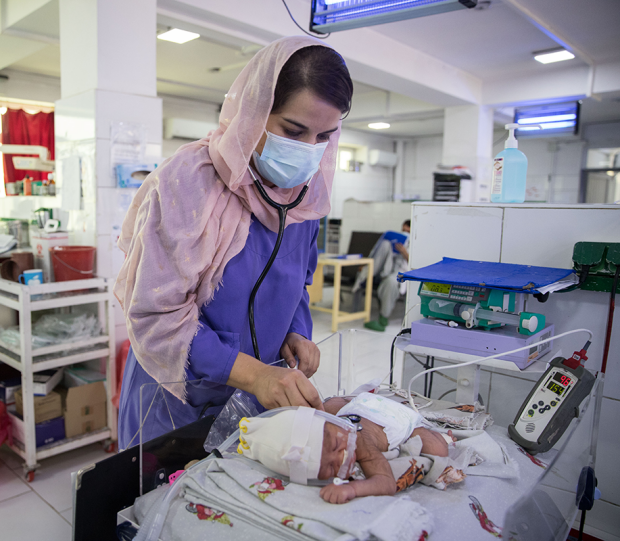
Just a standard day in Khost, Afghanistan
Just a typical day in Khost, Afghanistan
(2 January 2014)
7:30am: Breakfast with Nescafé and Afghan bread with Nutella. It continues to amaze me what you can find in Kabul. The presence of American troops, now in the country for 12 years, has something to do with it. We have cornflakes, mediocre Slovak chocolate, and even pesto sauce. Afghanistan may seem dry and barren, but you can find locally grown bananas, pears, and pomegranates.
Sigrid, the Norwegian paediatrician, enters after a difficult night. A premature baby, one of a set of twins, died an hour ago. The babies weighed 1400g and 1500g, two small boys. The 1400g baby survived the first few days, so we had started to have hope. However, due to lung problems, the little one couldn't make it any further. His slightly larger brother, weighing 1500g, is doing reasonably well so far.
Sigrid comes from the country with the best social system in the world and is a neonatologist. Her job in Norway is to keep babies weighing 500 grams alive. This 1400g boy would almost certainly have made it in Norway, so accepting such a death is very difficult as a doctor. The priority for Doctors Without Borders in this project is the mothers. In Afghanistan, the mother is 100 times more important than the baby. We provide the small premature babies with antibiotics, sugar water, and keep them warm with a lamp in a bed, but that's where it stops.
It's survival of the fittest. Sometimes miracles happen, but not always.
"This baby did not have to die," says Sigrid.
Strong Italian coffee made by Cristina, our Italian anaesthetist, and a listening ear. It helps - a little.
8:00am: Morning meeting. To guarantee our safety, we live on the hospital grounds, so I haven't seen much of the city of Khost yet. The landscape is beautiful and is now covered by a layer of fresh snow. Afghan men are throwing snowballs at each other, and a few, with quite some courage, even try to hit us. Sigrid and I laughingly dodge the snowballs. No Afghan man would ever throw a snowball at an Afghan woman (women are dressed in burqas, and men aren't even allowed to look at them), but as expat women, we truly feel that we are seen here as a "third sex," something between a man and a woman.
11:00am: Ward round. Aisha wants to go home. She gave birth to her 13th baby yesterday, eight girls and five boys, and they are all alive, she proudly says. The 12 children at home are waiting for their mother. Aisha also experienced the almost obligatory postpartum bleeding, and it was a real postpartum haemorrhage. Her haemoglobin dropped from 11 to 7.2, so she was on the verge of needing a blood transfusion. Yesterday, I stood there, sweating and massaging her uterus while waiting for the medication to take effect. Today, she wants to go home as soon as possible. She says she feels good and the children need her.
"Aisha, family planning!" I say. Or 'waqfa' in Pashto. The 13 children need her, and we don't want her to bleed to death after giving birth to baby number 14. In Pashto, she answers that she accepts every baby that Allah gives her.
After 10 minutes of discussion, during which I suggested that God wants us to use our brains and accept the opportunities we are given (I remembered the quote from the Quran/Hadith of Mohammed, "Trust in Allah, but tie your camel"), she agreed to birth control injections. This way, she wouldn't be able to get pregnant for three months.
Whether she will come back for the next injection, we can only guess. During the Taliban period between 1996 and 2001, birth control was prohibited by law, and women didn't have access to education. Now, more than 10 years later, things have improved slightly, but it remains a difficult topic in Afghan culture.
2pm: Lunch. Nour, our Afghan cook, is glued to the radio. Afghanistan is playing the cricket semi-finals against Pakistan in some international tournament. We quickly realise that our lunch will be a bit late today. Sports unite people, everywhere in the world, even in the middle of a war zone.
7pm: Caesarean section for a miracle baby. The mother arrived here after a two-hour journey with 50 cm of umbilical cord hanging between her legs. It's -10°C outside. When she was carried inside, I thought the child would never survive. But the 2200g girl came out alive and kicking.
Sometimes, God is with us.
9pm: Discussion among the expats about the statistics. The hospital has been open for almost a year. More than 11,000 women have given birth here in the past year, which means that almost every family in Khost province has had a baby born at our hospital. Unfortunately, we also lost five women due to complications during their pregnancy. A healthy baby and a healthy mother are a gift from Allah, as our Afghan colleagues say.
We see our patients at a crisis moment in their lives, and we try to do our best in Afghan conditions. Afterwards, they continue with their lives, and all we can say is "Da Allah pa Aman," which means "Go with God in peace" in Pashto. This is the beautiful expression to bid someone farewell here. Da Allah pa Aman.
Séverine